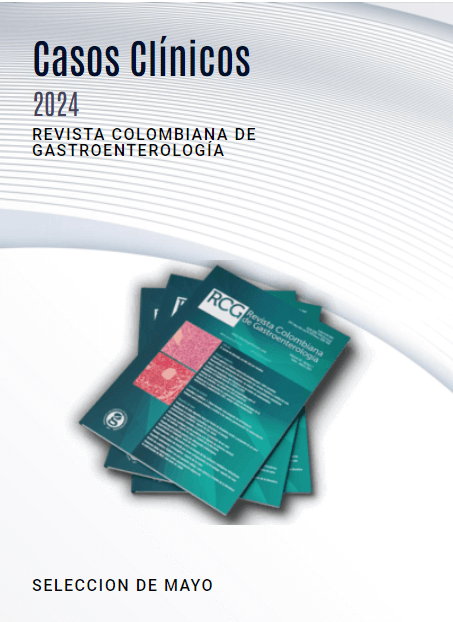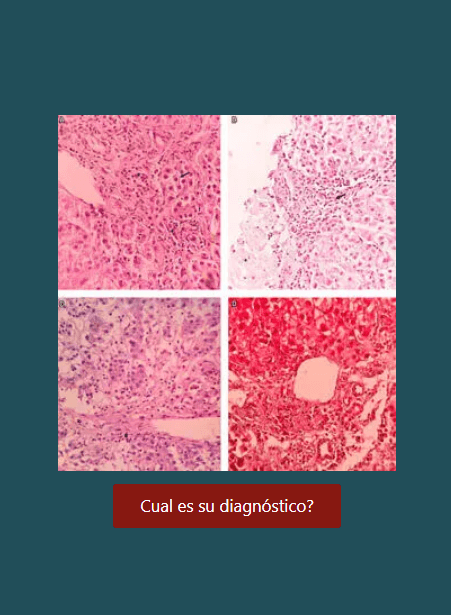Medicamentos causantes de hepatotoxicidad en el embarazo: revisión estructurada
DOI:
https://doi.org/10.22516/25007440.128Palavras-chave:
Hepatotoxicidad, embarazo, enfermedad hepática inducida por medicamentosResumo
Objetivo: identificar los medicamentos y determinar las principales características asociadas con hepatotoxicidad por medicamentos en el embarazo.
Método: revisión estructurada en PubMed/Medline, EMBASE y Web of Science utilizando los términos: Drug induced liver injury OR Hepatotoxicity AND Pregnancy. La búsqueda incluyó artículos en inglés, español, humanos, entre 2005 y 2015, con información sobre hepatotoxicidad por medicamentos en el embarazo. Fueron excluidos los artículos sin relación con embarazo o hepatotoxicidad, asociados con otras causas de enfermedad hepática o con hepatotoxicidad por otras sustancias. La información del medicamento y las características de los pacientes fueron registradas en una tabla. La probabilidad de la aparición de hepatotoxicidad fue valorada y agrupada en tres categorías: definida, probable y posible; para algunos medicamentos fue determinada por el método RUCAM.
Resultados: fueron identificados 488 artículos, de los cuales 46 fueron seleccionados. Fueron identificados también 12 medicamentos (acetaminofeno, alfametildopa, labetalol, metotrexato, saquinavir, nevirapina, propiltiouracilo, metimazol, carbimazol, nitrofurantoína, ácido acetilsalicílico y piperidolato) con probabilidad de causar hepatotoxicidad en el embarazo. Algunas características asociadas con los fármacos fueron: tiempo de aparición de las reacciones, semanas de embarazo (3-36), factores de riesgo (edad y enfermedades crónicas), manifestaciones clínicas (elevación de transaminasas, prurito, ictericia) y desenlaces (trasplante de hígado, muertes materna y fetal).
Conclusión: los medicamentos acetaminofeno, alfametildopa, labetalol, metotrexato, saquinavir, nevirapina, propiltiouracilo, metimazol, carbimazol, nitrofurantoína, ácido acetilsalicílico y piperidolato podrían causar hepatotoxicidad en pacientes embarazadas. Además de la dosis y del tiempo de exposición al fármaco, la edad y el tiempo de gestación podrían influir en la presentación y gravedad de la hepatotoxicidad.
Downloads
Referências
Vázquez-Benitez E. El uso de algunos farmacos y sus riesgos durante el embarazo. Gac Méd Mex. 1996;132(5):541-3.
Lorente S, Serrano T. Enfermedades hepáticas propias del embarazo. Rev Esp Enf Dig. 2010;102(8):505-6. doi: https://doi.org/10.4321/s1130-01082010000800010
Gallego M, Delgado L, Campos M, et al. Actualización del uso de fármacos durante el embarazo: categorías de riesgo. Farm Hosp. 2014;38(4):364-78.
Abad F, Pons J, Micó M, et al. Categorías de riesgo de los medicamentos utilizados durante el embarazo: Guía rápida de consulta. Farm Aten Prim. 2005;3(2):49-61.
Pérez A, Allende M, Agustín M, et al. Teratogénesis: clasificaciones. Farm Hosp. 2002;26(3):171-7.
Vallano A, Arnau J. Antimicrobianos y embarazo. Enferm Infecc Microbiol Clin. 2009;27(9):536-42. doi: https://doi.org/10.1016/j.eimc.2009.09.001
Lyons F, Hopkins S, Kelleher B, et al. Maternal hepatotoxicity with nevirapine as part of combination antiretroviral therapy in pregnancy. HIV Med. 2006;7(4):255-60. doi: https://doi.org/10.1111/j.1468-1293.2006.00369.x
Coster L, Kumar P. Contemporary role of nevirapine in HIV treatment. AIDS Rev. 2012;14(2):132-44.
Gómez E, Lizbeth C. Manejo del trastorno bipolar en el embarazo. Rev Med MD. 2012;3(3):154-62.
Petit D. The use of antithyroid drugs. Calif Med. 1951;74(2):99-104.
Cassina M, Doná M, Di Gianantonio E, et al. Pharmacologic treatment of hyperthyroidism during pregnancy. Birth Defects Res Clin Mol Teratol. 2012;94(8):612-9. doi: https://doi.org/10.1002/bdra.23012
Amariles P, Giraldo N, Faus M. Interacciones medicamentosas: aproximación para establecer y evaluar su relevancia clínica. Med Clin (Barc). 2007;129(1):27-35. doi: https://doi.org/10.1157/13106681
Danan G, Benichou C. Causality assessment of adverse reactions to drugs-I. A novel method based on the conclusions of international consensus meetings: application to drug-induced liver injuries. J Clin Epidemiol. 1993;46(11):1323-30. doi: https://doi.org/10.1016/0895-4356(93)90101-6
Thornton S, Minns A. Unintentional chronic acetaminophen poisoning during pregnancy resulting in liver transplantation. J Med Toxicol. 2012;8:176-8. doi: https://doi.org/10.1007/s13181-012-0218-2
Wilkes J, Clark L, Herrera J. Acetaminophen overdose in pregnancy. South Med J. 2005;98(11):1118-23. doi: https://doi.org/10.1097/01.smj.0000184792.15407.51
Slim R, Ben Salem C, Hmouda H, et al. Hepatotoxicity of alpha-methyldopa in pregnancy. J Clin Pharm Ther. 2010;35:361-3. doi: https://doi.org/10.1111/j.1365-2710.2009.01078.x
Firoz T, Webber D, Rowe H. Drug-induced fulminant hepatic failure in pregnancy. Obstet Med. 2015;8(4):190-2. doi: https://doi.org/10.1177/1753495X15598909
Gilani M, Fariba B, Behtash N, et al. The WHO score predicts treatment outcome in low risk gestational trophoblastic neoplasia patients treated with weekly intramuscular methotrexate. J Cancer Res Ther. 2013;9(1):38-43. doi: https://doi.org/10.4103/0973-1482.110357
Solís I, Mu-oz E, Tomás J, et al. Características maternas en una cohorte de gestantes con infección por el VIH-1. Med Clin (Barc). 2006;127(4):121-5. doi: https://doi.org/10.1157/13090377
Minniear T, Zeh C, Polle N, et al. Rash, Hepatotoxicity and hyperbilirubinemia among Kenyan infants born to hiv-infected women receiving triple-antiretroviral drugs for the prevention of mother-to-child HIV transmission. Pediatr Infect Dis J. 2012;31(11):1155-7. doi: https://doi.org/10.1097/INF.0b013e318267ef6a
Snijdewind I, Smit C, Godfried M, et al. HCV coinfection, an important risk factor for hepatotoxicity in pregnant women starting antiretroviral therapy. J Infect. 2012;64(4):409-16. doi: https://doi.org/10.1016/j.jinf.2011.12.012
Brunet C, Reliquet V, Jovelin T, et al. Effectiveness and safety of saquinavir / ritonavir in HIV-infected pregnant women: INEMA cohort. Med Mal Infect. 2012;42:421-8. doi: https://doi.org/10.1016/j.medmal.2012.07.010
Bottaro E, Huberman M, Iannella M, et al. Nevirapine-associated toxicity in clinical practice in Buenos Aires, Argentina. J Int Assoc Physicians AIDS Care. 2010;9(5):306-12. doi: https://doi.org/10.1177/1545109710376250
Peters P, Polle N, Zeh C, et al. Nevirapine-associated hepatotoxicity and rash among HIV-infected pregnant women in Kenya. J Int Assoc Physicians AIDS Care. 2012;11(2):142-9. doi: https://doi.org/10.1177/1545109711423445
Kochar R, Nevah M, Lukens F, et al. Vanishing bile duct syndrome in human immunodeficiency virus : Nevirapine hepatotoxicity revisited. World J Gastroenterol. 2010;16(26):3335-8. doi: https://doi.org/10.3748/wjg.v16.i26.3335
Jamisse L, Balkus J, Hitti J, et al. Antiretroviral-associated toxicity among HIV-1 – Seropositive pregnant women in Mozambique receiving nevirapine-based regimens. Acquir Immune Defic Syndr. 2007;44(4):371-6. doi: https://doi.org/10.1097/QAI.0b013e318032bbee
Timmermans S, Tempelman C, Godfried M, et al. Nelfinavir and nevirapine side effects during pregnancy. AIDS Rev. 2005;19:795-9.
https://doi.org/10.1097/01.aids.0000168973.59466.14
Phanuphak N, Apornpong T, Teeratakulpisarn S, et al. Nevirapine-associated toxicity in HIV-infected Thai men and women, including pregnant women. HIV Med. 2007;8:357-66. doi: https://doi.org/10.1111/j.1468-1293.2007.00477.x
Coffie P, Tonwe-Gold B, Tanon A, et al. Incidence and risk factors of severe adverse events with nevirapine-based antiretroviral therapy in HIV-infected women. MTCT-Plus program, Abidjan, Côte d'Ivoire. BMC Infect Dis. 2010;10:188. doi: https://doi.org/10.1186/1471-2334-10-188
Kilewo C, Karlsson K, Ngarina M, et al. Prevention of mother-to-child transmission of HIV-1 through breastfeeding by treating mothers with triple antiretroviral therapy in Dar es Salaam, Tanzania: The Mitra Plus study. J Acquir Immune Defic Synd. 2009;52(3):406-16. doi: https://doi.org/10.1097/QAI.0b013e3181b323ff
Kondo W, Carraro E, Prandel E, et al. Nevirapine-induced side effects in pregnant women – experience of a Brazilian university hospital. BJID. 2007;11(6):544-8. doi: https://doi.org/10.1590/s1413-86702007000600004
Natarajan U, Pym A, Mcdonald C, et al. Safety of nevirapine in pregnancy. HIV Medicine. 2007;8:64-9. doi: https://doi.org/10.1111/j.1468-1293.2007.00433.x
Marazzi M, Germano P, Liotta G, et al. Safety of nevirapine-containing antiretroviral triple therapy regimens to prevent vertical transmission in an African cohort of HIV-1-infected pregnant women. HIV Medicine. 2006;7:338-44. doi: https://doi.org/10.1111/j.1468-1293.2006.00386.x
Joy S, Poi M, Hughes L, et al. Third-trimester maternal toxicity with nevirapine use in pregnancy. Obstet Gynecol. 2005;106(5):1032-8. doi: https://doi.org/10.1097/01.AOG.0000180182.00072.e3
Ouyang D, Shapiro D, Lu M, et al. Increased risk of hepatotoxicity in HIV-infected pregnant women receiving antiretroviral therapy independent of nevirapine exposure. AIDS Rev. 2009;23(18):2425-30. doi: https://doi.org/10.1097/QAD.0b013e32832e34b1
Ouyang D, Brogly S, Lu M, et al. Lack of increased hepatotoxicity in HIV-infected pregnant women receiving nevirapine compared to other antiretrovirals. AIDS Rev. 2010;24(1):109-14. doi: https://doi.org/10.1097/QAD.0b013e3283323941
Pillay P, Black V. Safety, strength and simplicity of efavirenz in pregnancy. South Afr J HIV Med. 2012;13(1):28-33.
Ford N, Calmy A, Andrieux-Meyer I, et al. Adverse events associated with nevirapine use in pregnancy: a systematic review and meta-analysis. AIDS Rev. 2013;27:1135-43. doi: https://doi.org/10.1097/QAD.0b013e32835e0752
Aaron E, Kempf M-C, Criniti S, et al. Adverse events in a cohort of HIV infected pregnant and non-pregnant women treated with nevirapine versus non-nevirapine antiretroviral medication. PLoS One. 2010;5(9):e12617. doi: https://doi.org/10.1371/journal.pone.0012617
Ekiz B, Soysal N, Kirkizlar O, et al. Effectiveness of preoperative plasmapheresis in a pregnancy complicated by hyperthyroidism and anti-thyroid drug-associated angioedema. Gynecol Endocrinol. 2013;29(5):508-10. doi: https://doi.org/10.3109/09513590.2012.754871
Miyamura T, Kanda T, Minemura S, et al. Acute liver failure associated with propylthiouracil in a pregnant 26-year-old woman. Case Rep Gastroenterol. 2013;7(2):240-4. doi: https://doi.org/10.1159/000351877
Sequeira E, Wanyonyi S, Dodia R. Severe propylthiouracil-induced hepatotoxicity in pregnancy managed successfully by liver transplantation: A case report. J Med Case Rep. 2011;5:461. doi: https://doi.org/10.1186/1752-1947-5-461
Lo J, Rivkees S, Chandra M, et al. Gestational thyrotoxicosis, antithyroid drug use and neonatal outcomes within an integrated healthcare delivery system. Thyroid. 2015;25(6):698-705. doi: https://doi.org/10.1089/thy.2014.0434
Yoshihara A, Noh J, Watanabe N, et al. Frequency of adverse events of antithyroid drugs administered during pregnancy. J Thyroid Res. 2014;2014:952352. doi: https://doi.org/10.1155/2014/952352
Akmal A, Kung J. Propylthiouracil, and methimazole, and carbimazole-related hepatotoxicity. Expert Opin Drug Saf. 2014;13(10):1397-406.
https://doi.org/10.1517/14740338.2014.953796
Glinoer D, Cooper D. The propylthiouracil dilemma. 2012;19(5):402-7.
Azizi F, Amouzegar A. Management of hyperthyroidism during pregnancy and lactation. Eur J Endocrinol. 2011;164:871-6. doi: https://doi.org/10.1530/EJE-10-1030
Aksamija A, Horvat G, Habek D, et al. Nitrofurantoin-induced acute liver damage in pregnancy. Arh Hig Rada Toksikol. 2009;60:357-61. doi: https://doi.org/10.2478/10004-1254-60-2009-1940
Tsuyoshi H, Nishijima K, Takahashi J, et al. Management of druginduced hyperbilirubinaemia in early pregnancy. S Afr J Obstet Gynaecol. 2013;19(1):22-3. doi: https://doi.org/10.7196/sajog.580
Dietrich C, Geier A. Effect of drug transporter pharmacogenetics on cholestasis. Expert Opin Drug Metab Toxicol. 2014;10(11):1533-51. doi: https://doi.org/10.1517/17425255.2014.963553
Magnus P, Meier P, Stieger B. Genetic determinants of drug-induced cholestasis and intrahepatic cholestasis of pregnancy. Semin Liver Dis. 2010;30(2):147-59. doi: https://doi.org/10.1055/s-0030-1253224
Peña J, Ramos J, Pedrol P, et al. Tratamiento de la mujer embarazada infectada por el VIH. Enferm Infecc Microbiol Clin. 2002;20(Suppl 2):29-34.
Ali T, Srinivasan N, Le V, et al. Alpha-methyldopa hepatotoxicity in pregnancy. J Coll Physicians Surg Pak. 2009;19(2):125-6.
Andreotti M, Pirillo M, Liotta G, et al. The impact of HBV or HCV infection in a cohort of HIV-infected pregnant women receiving a nevirapine-based antiretroviral regimen in Malawi. BMC Infect Dis. 2014;14:180. doi: https://doi.org/10.1186/1471-2334-14-180
Bera E, Mia R. Safety of nevirapine in HIV-infected pregnant women initiating antiretroviral therapy at higher CD4 counts: A systematic review and meta-analysis. S Afr Med. 2012;102(11):855-9. doi: https://doi.org/10.7196/SAMJ.5700
Cecchini D, Urueña A, Trinidad P, et al. HIV and pregnancy: maternal and neonatal evolution. Medicina (B Aires). 2011;71(5):432-6.
Downloads
Publicado
Como Citar
Edição
Seção
Licença
Aquellos autores/as que tengan publicaciones con esta revista, aceptan los términos siguientes:
Los autores/as ceden sus derechos de autor y garantizarán a la revista el derecho de primera publicación de su obra, el cuál estará simultáneamente sujeto a la Licencia de reconocimiento de Creative Commons que permite a terceros compartir la obra siempre que se indique su autor y su primera publicación en esta revista.
Los contenidos están protegidos bajo una licencia de Creative Commons Reconocimiento-NoComercial-SinObraDerivada 4.0 Internacional.

| Métricas do artigo | |
|---|---|
| Vistas abstratas | |
| Visualizações da cozinha | |
| Visualizações de PDF | |
| Visualizações em HTML | |
| Outras visualizações | |


















